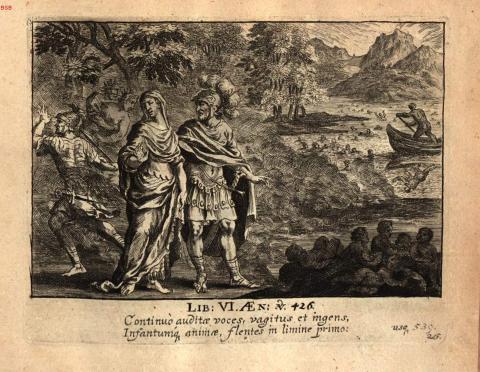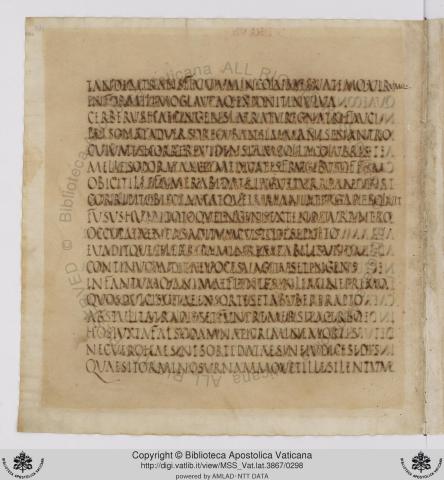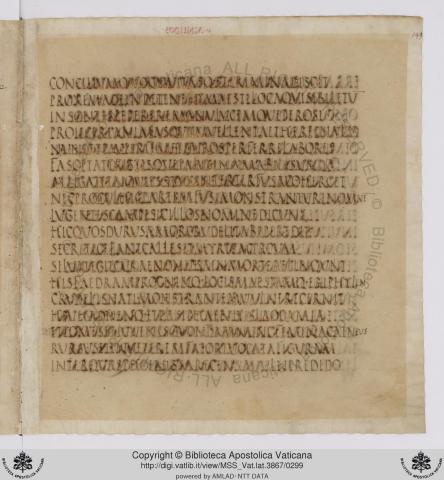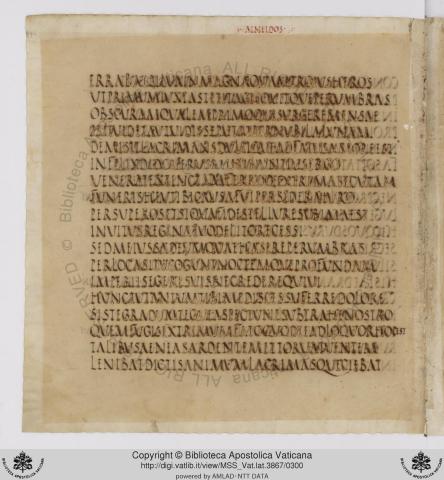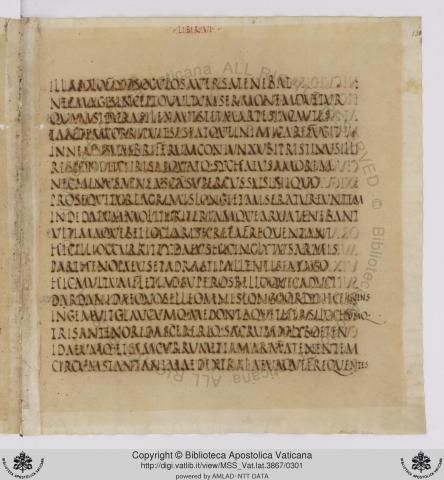Continuō audītae vōcēs vāgītus et ingēns
īnfantumque animae flentēs, in līmine prīmō
quōs dulcis vītae exsortēs et ab ūbere raptōs
abstulit ātra diēs et fūnere mersit acerbō;
hōs iūxtā falsō damnātī crīmine mortis.430
Nec vērō hae sine sorte datae, sine iūdice, sēdēs:
quaesītor Mīnōs urnam movet; ille silentum
cōnsiliumque vocat vītāsque et crīmina discit.
Proxima deinde tenent maestī loca, quī sibi lētum
īnsontēs peperēre manū lūcemque perōsī435
prōiēcēre animās. Quam vellent aethere in altō
nunc et pauperiem et dūrōs perferre labōrēs!
Fās obstat, trīstisque palūs inamābilis undae
alligat et noviēs Styx interfūsa coercet.
Nec procul hinc partem fūsī mōnstrantur in omnem440
Lūgentēs Campī; sīc illōs nōmine dīcunt.
Hīc quōs dūrus amor crūdēlī tābe perēdit
sēcrētī cēlant callēs et myrtea circum
silva tegit; cūrae nōn ipsā in morte relinquunt.
Hīs Phaedram Procrinque locīs maestamque Eriphӯlēn445
crūdēlis nātī mōnstrantem vulnera cernit,
Euadnēnque et Pāsiphaēn; hīs Lāodamīa
it comes et iuvenis quondam, nunc fēmina, Caeneus
rūrsus et in veterem fātō revolūta figūram.
Inter quās Phoenissa recēns ā vulnere Dīdō450
errābat silvā in magnā; quam Trōïus hērōs
ut prīmum iūxtā stetit agnōvitque per umbrās
obscūram, quālem prīmō quī surgere mēnse
aut videt aut vīdisse putat per nūbila lūnam,
dēmīsit lacrimās dulcīque adfātus amōre est:455
'Īnfēlīx Dīdō, vērus mihi nūntius ergō
vēnerat exstīnctam ferrōque extrēma secūtam?
Fūneris heu tibi causa fuī? Per sīdera iūrō,
per superōs et sī qua fidēs tellūre sub īmā est,
invītus, rēgīna, tuō dē lītore cessī.460
sed mē iussa deum, quae nunc hās īre per umbrās,
per loca senta sitū cōgunt noctemque profundam,
imperiīs ēgēre suīs; nec crēdere quīvī
hunc tantum tibi mē discessū ferre dolōrem.
Siste gradum tēque aspectū nē subtrahe nostrō.465
Quem fugis? Extrēmum fātō quod tē adloquor hoc est.'
Tālibus Aenēās ārdentem et torva tuentem
lēnībat dictīs animum lacrimāsque ciēbat.
Illa solō fīxōs oculōs āversa tenēbat
nec magis inceptō vultum sermōne movētur470
quam sī dūra silex aut stet Marpēsia cautēs.
Tandem corripuit sēsē atque inimīca refūgit
in nemus umbriferum, coniūnx ubi prīstinus illī
respondet cūrīs aequatque Sychaeus amōrem.
Nec minus Aenēās cāsū percussus inīquō475
prōsequitur lacrimīs longē et miserātur euntem.
notes
Manuscripts: M 426-436, 437-465, 466-476 | P 426-439, 440-462, 463-476 | R 426-432, 433-450, 451-468, 469-476
First Aeneas meets the souls of those who died before their time, as infants, or as victims of unjust sentences, or as suicides (Knapp). Aeneas next arrives at the fields of mourning (lugentēs campī), where dwell the shades of such as have in any way come to an untimely end on account of love. Here he meets Dido, and in vain tries to obtain her forgiveness (Frieze).
continuō: immediately on leaving the bank (Conington). vāgītus: regularly of the “wail of infants” (Page). Vagitus infantumque animae flentēs = vagitus animārum flentium (Conington). Note the alliteration and onomatopoetic effect of vōcēs vāgītus. The children are wailing, not because of their lot, but because “their crying and sadness are merely their earthly character and condition carried with them into Hades…The infants are placed in the very entrance and beginning of Hades,” because such location was “peculiarly suitable for those who had died in the very beginning and entrance of life” (Henry). They are assigned to neutral ground, the place neither of punishment, nor of joy. In the first circle of his Inferno, Dante places the spirits of those who died unbaptized, before Christianity (Inferno 4). In that Limbo Vergil himself “abides with the innocent babes bitten by the fangs of death, ere they were exempt from human sin” (Purgatorio 7.31 ff.) (F-B).
427: infantum: dependent on all three nominatives, vōces, vāgītus, and animae (Bennett). in līmine prīmō: supply Orcī (P-H): “at the very threshold.” Having passed by the cave where the watchdog lies, he now enters the dwelling place of the shades through a gateway (Frieze). Those cut off by an untimely death could not obtain full admission to the underworld (Knapp). Doubtless a connection is suggested between “the threshold of the grave” and those who have only just passed the threshold of life, but to put a stop after flentēs and connect vītae with līmine is unnatural: vītae goes with exsortēs (Page).
428: vītae: objective genitive (AG 348) with exsortēs (Pharr).
429: ātra diēs: = diēs mortis (Pharr). “A black” or “dismal (Bennett) day carried off and plunged in bitter death.” Diēs ātrī in the Roman calendar were unlucky days, marked with black, on which no legal business could be transacted (Page). Black is the color regularly associated with death and its accessories (Bennett). acerbō: contrasted with dulcis above (“bitter”, “unripe” (P-H)), but the word is specially used even in prose of premature or “untimely” death (Page). mersit: > mergō, of plunging in doom (Conington).
430: hōs iuxtā falsō damnātī crīmine mortis: “Near them the souls condemned to death upon a false charge” (P-H). crīmine: “accusation” (G-K); “charge” (Comstock). mortis: with damnātī, “condemned to death on a false charge” (Page). Verbs of accusing, convicting, condemning, and acquitting take the genitive of the charge (AG 352) (Pharr). The ablative of the penalty is more usual (Carter). sine sorte, sine iūdice: a kind of hendiadys, as if it were “without judges selected by lot.” The unjustly slain have now an impartial trial (G-K); “without trial or judge” (Comstock); “without lot or judge,” i.e. without judges chosen by lot; iūdice is a collective singular (F-B). With a reference to the sortitiō iūdicium (“appointment of the jury by lot”) in a Roman court by the magistrate investigating the case (quaesitor), who here is Minos who “shakes the urn (urnam movet, 432) and holds assize among the silent, and examines the record of their lives” (Page). The customs of the Romans are here alluded to. Minos as quaesitor, praetor, or presiding officer of the court, assigns judges, or jurors (iūdicēs), to decide on the case of each individual. These jurors he appoints by drawing lots, inscribed with the names of those entitled to be judges, from an urn (movet urnam) (Frieze).
431-433: These lines explain how those unjustly condemned and suicides find places in the same quarter with those dying in infancy (P-H).
432: quaesītor: “presiding judge” (Carter); “as presiding magistrate” (Bennett). Mīnōs: Minos, King of Crete. In consequence of his uprightness he was conceived as dispensing justice in the underworld (Bennett). Minos is chiefly remarkable as belonging to a period when history and mythology interlace, and as uniting in his own person the chief characteristics of both. He is the son of Jupiter, and yet the first possessor of a navy; a judge in Hades, but not the less for that a king of Crete. In Homer, Minos judges the dead (Odyssey 9.707). Plato associates Minos, Rhadamanthus, Aeacus, and Triptolemus as judges in Hades (Apology 41a) (H-M). urnam movet: “shakes the urn,” until the tablets bearing the names “leap out,” one by one (Comstock) to select the iūdicēs, who were chosen by lot (Pharr).The allotment referred to in the preceding note is conducted by Minos, as the presiding magistrate (F-B). concilium: refers to the assemblage of those who are to be tried (Conington); “’tis he who summons a panel of the silent dead”; i.e., to act as a jury (F-B). Whether concilium silentum denotes a body of iūdicēs selected from the shades themselves, or an assemblage of those who are to be tried, is not clear (P-H).
432-433: silentum…discit: = silentium (Pharr), i.e., “of the silent (ghosts)” (Bennett). Genitive plural substantive of sīlēns, silentis, in reference to the dead (Conington). “He both summons the assembly of the silent (shades) and investigates their lives and their transgressions.” That is, it is his prerogative to summon them before the court, and to investigate and decide each case according to the method of procedure above explained. The Greeks, however, supposed Minos, Rhadamanthus, and Aeacus to constitute one tribunal, acting, of course, without the intervention of jurors (Frieze). Minos conducts the cognitiō and discit takes the place of the technical cognoscit (F-B). Dante (Inferno 5.1 ff.) makes of Minos a demon who, at the entrance of the second circle of Hell, receives the damned and assigns to each his penalty (G-K). crīmina: the “charges” which worked their death; cf. 430. We shall see presently that some souls are assigned to Elysium, others to Tartarus, according as their deeds done in the flesh were good or bad. The three classes here are in a neutral region; since their lives were prematurely cut off, the record of their deeds was incomplete and there was no chance for a final assignment (Knapp). discit: The investigation must not be thought of according to our proceedings, but as more like the French, in which the court is the agent of the government to detect and punish. Hence, here, the judge himself conducts a preliminary investigation embracing the whole life and conduct of the criminal, and not limited as with us to the particular offence (G-K).
434-435: sibi lētum peperēre: i.e., committed suicide (Bennett). peperēre: = peperērunt, perfect 3rd plural of pariō (Chase). manū: supply suā (Pharr), almost = ipsī (Conington); i.e. by their own hand, but implying violence, as in 395 (F-B). lūcem: i.e., the light of life (F-B). maestī: anticipates verses 436 and 437 (Conington). The suicides are maestī, because they were so in life (F-B). Vergil was guided by his great master Plato, who says on this subject, that a man is placed in his station of life, like a soldier in his proper post, which he is not to quit, whatever may happen, until he is called off by his commander who planted him in it (H-M). insontēs: “guiltless (of any crime)” (Bennett), because they had done nothing worthy of death, so that their death was gratuitous (Conington); “needlessly” (Knapp); “though free from guilt”; i.e., they took their lives, not because of moral guilt, but in misery or despair (F-B). The opinion of suicide here expressed differs strikingly from the language of Horace, who had in view the teaching of the Stoics (Page). Dante treats them much more severely. They are cast into the second ring of the seventh circle, and suffer the fate of Polydorus (3.22 ff.), becoming stunted trees, on which the Harpies feed (Inferno, Canto 13) (F-B).
436: prōiēcēre animās: prōiēcēre = prōiēcērunt; “threw their lives away,” as Dryden renders it (Conington). Quam vellent…perferre: “How gladly would they now endure,” i.e., were it possible (Comstock); “How they would wish…!” i.e. if there were any possible chance (F-B). The imperfect subjunctive expresses the hopelessness of the wish (Carter). aethere in altō: “upper air” (Comstock); “on earth,” whose air is high above Hades (Pharr); = in vītā (Conington).
437: nunc: (emphatic): as opposed to their feeling when alive (G-K). pauperiem…labōrēs: pauperiem and dūrōs labōrēs are perhaps chosen to indicate the things for fear of which men have been driven to death (Conington).
438: fās obstat: fās here is almost in the sense of “fate” (Page) or “will of the gods” (Carter). Many MSS. give fāta obstant (Page); Servius here explains fāta as iūra nātūrae (Conington). inamābilis: “unlovely”; litotes, and so = “hateful” (Page). palūs, Styx: denote the same thing (Knapp).
439: interfūsa: “interposed” (Comstock); i.e., between their present abode and the altus aethēr (435) (Knapp).
440: partem fūsī…in omnem: “spreading out in all directions” (Carter); “extending in every direction” (Frieze); “outspread on every side.” The Mourning Fields are spacious, giving to the sorrowing dead the solitude they crave. Similarly Dante (F-B).
441: Lugentēs Campī: the expression is apparently original with Vergil (F-B). nōmine dīcunt: = vocant (Pharr).
442: quōs…perēdit: “whom love unpitying has consumed with cruel wasting” (Page). Quōs is masculine because both sexes are included (Frieze). Understand eōs as antecedent of quōs (F-B), the implied object of cēlant (G-K).
443: sēcrētī callēs: “sequestered glades”; for callēs not “paths” but “the open, clear, grassy parts in a wood, used for grazing cattle” (Page). cēlant: supply eōs (Pharr). myrtea: because the myrtle is sacred to Venus, the goddess of love (Page); its presence was therefore very appropriate in the region inhabited by the spirits of those who had died of love (Carter).
444: silva: Vergil’s silva suggested to Dante his “mournful wood,” fringing a barren plain (Inferno 14.10) (F-B). cūrae: meaning, as often, the pains and sorrows of love (Carter).
445–449: a litany of souls dwelling in the Lugentēs Campī: Phaedra: wife of Theseus, slew herself in consequence of her unreturned passion for her step-son Hippolytus; Procris jealously watched her husband Cephalus and was accidentally killed by him when out hunting; Eriphyle was killed by her son Alcmaeon because she had been bribed by the gift of a necklace to persuade her husband Amphiaraus to join the expedition of the Seven against Thebes, where he perished; Evadne, wife of Capaneus, who was also slain at Thebes, flung herself on his funeral pyre; Pasiphaē, wife of Minos and mother of the Minotaur, was an example of unnatural passion (Comstock); Laodamia, wife of Protesilaus, the first Greek slain at Troy, obtained permission for her husband to return to life for three hours and then died with him; Caeneus had been a maiden named Caenis, but was changed by Poseidon into a young man (Page). Thus transformed, he was also made invulnerable, and hence, in the contest of the Centaurs and Lapithae, in which Caeneus was engaged, the Centaurs cast trees upon him until their weight forced his body into the earth. In Hades the youth was again transformed to Caenis, the beautiful girl (Frieze). Procris and Eriphyle do not actually belong here, since they did not die of love. Vergil is following a Homeric passage describing the visit of Ulysses to the underworld; in this Homer dwells on heroines in general (Knapp).
446: crūdēlis nātī: i.e., Alcmaeon (F-B); subjective genitive (AG 343 note 1); “the wounds inflicted by her cruel son” (Pharr).
447: hīs: with comes (F-B).
450: recēns ā vulnere: “her wound still fresh”: she had stabbed herself with the sword of Aeneas on his departure (cf. 4.646) (Page). Dīdō: Vergil’s general model for this meeting of Aeneas and Dido is the Homeric scene of the meeting of Ajax and Odysseus in the lower world (Odyssey 11.541 ff.). Dante places Dido in the second circle of Hell, with Cleopatra and Helen of Troy (Inferno 5) (F-B).
451: silvā in magnā: suggests solitude (Knapp).quam: accusative with iuxtā and understood with agnōvit (Pharr): “and as soon as the Trojan hero stood near to her” (Frieze).
453: obscūram: with quam = Dīdōnem (Knapp): “a dim shape” (Page); “dimly seen” (Carter); “dimly outlined” (Comstock).
453–454: quālem…lūnam: “as one that sees, or thinks he sees, the young moon rising through the clouds” (P-H); “as when a man at the month’s beginning sees, or deems he saw, the moon rising through clouds.” The construction is quālem videt lūnam quī videt lūnam (Page). The simile explains obscūram, which is very emphatic by position (F-B). prīmō mense: “in the beginning of the (lunar) month”; when the new moon is easily obscured, (from the third day on, when the moon begins to be visible (F-B)) and one may be uncertain whether he sees it or not (Frieze).
454: per nūbila: join with videt and vīdisse (Frieze). Nicely balances per umbram (452) (Knapp).
455: dēmīsit: “let fall” (Carter). amōre: ablative of manner (AG 412) (Pharr).
456-457: vērus…secūtam: The emphasis is on vērus (G-K). “True, then, it seems, was the report I had heard that you were dead and with the sword had sought your doom” (Page); “Was it, then, a true report that told me you had perished and with the sword had sought your doom?” (Comstock). ergō: the inferential particle is very expressive, and implies long pondering over the fact (F-B).
456: nuntius: Vergil does not tell us how Aeneas received this news. He did learn from Mercury (4.564) that Dido was certa morī, and the sight of the blazing pyre filled him with gloomy forebodings, as he sailed away from Carthage (5.7) (F-B). vērus nuntius seems best understood of the blaze of the funeral pyre from which Aeneas conjectured Dido’s fate (Conington).
457: exstīnctam: supply tē…esse (Pharr). Indirect discourse (AG 580) in apposition with nuntius (Carter). extrēma: = mortem (Pharr). secūtam: supply te…esse (Pharr) as a continuation of the indirect discourse: “that you sought death,” literally “followed the last things” (Carter); “that you went to all lengths” (Knapp); “that you had gone to the utmost lengths,” “had taken the final step” (Bennett).
458: fūneris: note the emphatic position; “was it death (not merely sorrow) I brought you?” (F-B).
459: per superōs: “by the world above.” This means here the earth, but in 3.600, “the gods.” Aeneas thus swears by the heavens, the earth, and Hades (F-B). et sī qua fidēs…est: fidēs is a thing to swear by, and such as will ensure belief (P-H): “and by whatever pledge is valid in the grave” (Page); “by all that is most sacred here underground” (Conington); “if there is any (binding) pledge in (this) lower world”—by this I swear. He knows not what form of oath may satisfy the shades of the dead (Frieze).
460: invītus…cessī: for proof of this statement see 4.395–396: multa gemēns magnōque animum labefactus amōre / iussa tamen dīvum exsequitur classemque revīsit (“groaning much and his heart shaken with great love, still he follows the orders of the gods and returns to his fleet”) (Knapp).
461: mē: accusative object of ēgēre (463) (Carter). iussa deum: deum = deōrum; see 4.237: Nāviget! Haec summa est, hic nostrī nuntius estō! (“Let him sail! This is chief thing, let this be my message!”) and 4.270: ipse haec ferre iubet celerīs mandāta per aurās (“he himself—i.e. Jupiter—orders me to carry these commands through the swift breezes”) (Pharr).
462: loca senta sitū: senta = inculta (Comstock), suggests the wild and rough appearance of a place long uncared for (Knapp); “thorny”, hence “rough,” “ragged.” Sītus is (1) “a being left alone,” “neglect,” “absence of movement,” or (2) the effect of being so left alone, “rust,” “moldiness,” “decay”; here both meanings seem to be combined. The phrase here describes the condition of land left to itself, full of thorns and thistle—“through a land ragged and forlorn and through abysmal night” (Page); “squalid” or “noisome with mold”; “rough,” or “rugged through neglect” (Frieze).
463: imperiīs suīs: seems awkwardly added after iussa deum, imperia being the same as iussa (Conington). As though dī, not iussa deum, had stood in line 461 (Bennett). ēgēre: notice the first syllable is a long ē, distinguishing the verb, agō, from egeō (G-K); “have forced” (Comstock). nec crēdere quīvī: “nor could I have believed” (G-K).
464: hunc tantum: “so deep as this” (Comstock); “so great as this” (G-K), i.e., such as to cause your suicide (Frieze). Notice the force of hunc, a grief “as great as I now realize it was” (Carter). discessū: supply meō (F-B): “by my departure” (Chase). mē ferre: “that I was causing” (Comstock) or “bringing” (Knapp).
465: siste gradum: “stay your steps” (Comstock). aspectū: for aspectuī (Frieze); dative of separation (AG 381). nē subtrahe: the construction is archaic and therefore poetical (F-B).
466: quem fugis?: rhetorical for “Why do you flee me?” (Bennett). Aeneas is now the suppliant and Dido the obdurate one. Compare his question here with Dido’s (4.314) mēne fugis? (H-M). extrēmum …hoc est: “this is the last (time) I shall address you” (Pharr). fātō: fate will not suffer him to see her again, for after death he cannot expect to dwell in the lugentēs campī (Frieze). Ablative of cause (AG 404) (F-B), or instrumental ablative (AG 409) (P-H). quod: cognate accusative (AG 390) after adloquor (Pharr). Quod tē adloquor is virtually a substantive (Page). hoc: pronounce hocc, making long syllable (Pharr).
467: ardentem…tuentem: agreeing with animum; her mind shows itself in her angry look; and thus, as it were, it is her mind which sternly surveys him (Frieze): “her fierce and grim-eyed wrath.” Henry, however, takes the construction to be that of “the whole and the part affected”—“was soothing her fierce and grimly eyeing him, (was soothing) her rage” (Page); “the burning and fierce-eyed soul” (Mackail), a remarkably brief and forcible expression, animum being used for Dido herself (F-B). torva: neuter accusative plural, used adverbially: “fiercely” (Pharr); torva tuentem, “casting angry glances” (Carter); “gazing sternly at him” (Comstock).
468: lenībat: = old form of leniēbat, which could not be used in hexameter. It has a conative meaning here (AG 471c), “he tried to soothe” (Pharr). Many verbs may express an action which is incomplete or only attempted (Page). lacrimās ciēbat: “shed tears” (G-K); more naturally of Aeneas than Dido (Frieze).
470: inceptō: = quem Aenēās facere coeperat (Knapp), implying that this was merely the beginning, and that he would have continued, had she given him encouragement (Carter).
vultum movētur: “does she change her countenance” (F-B); accusative of respect / specification (Pharr); a.k.a. “Greek accusative” with movētur, middle voice, literally “she moves herself as to her face.” (AG 397b)
471: stet: substituted poetically (and more picturesquely (Carter)) for sit, the subject is illa understood (Frieze). The monosyllabic stō is used in preference to any of its compounds to express immovable fixity: the smallness of the word is its strength (Page). Adds to the idea of fixity suggested by silex and cautēs (Knapp). quam sī dūra silex aut stet Marpēsia cautēs: “than if she had the fixedness of stubborn flint or a crag of Marpessa” (Conington); “than if she were a standing image of hard flint or Marpesian rock” (F-B). The Marpesus is a Parian mountain famous for its white marble (Pharr).
472: tandem corripuit sēsē: supply ab Aenēā (Knapp); “at length she started”; used of the sudden convulsive movement with which she breaks from her trance (Page). “Flung herself away” (Morris); a fine touch, showing that notwithstanding her seeming indifference (468–470), she is still a creature of passion (F-B); “she hurried away” (Comstock).
473: nemus umbriferum: doubtless the murtea silva of line 443 (Conington). coniunx pristīnus: in the sense of “former,” “original” (Conington); = Sychaeus (Carter).
474: respondet cūrīs aequatque Sychaeus amōrem: i.e., she enjoys the full sympathy of Sychaeus, not necessarily on this new aggression of Aeneas, though we need not exclude it. “He answers all her cares and equals all her love” (Dryden); “responds to her sorrows.” Illī (473) is dative of reference (AG 376) with both respondet and aequat (F-B).
475: cāsū concussus inīquō: supply Dīdōnis (Pharr): “smitten to the heart by her unhappy fate” (Frieze); “stunned by her sad fate” (Rhoades). The very contempt with which she treats him shows how she has suffered (Carter).
476: prōsequitur lacrimīs et miserātur: supply eam (Pharr): “attends and pities her with his tears”; beautifully expressive of his tearful gaze (F-B). Prōsequitur, i.e., with his eyes (Comstock). longē: gives the result of corripuit sēsē (472) (Knapp).
vocabulary
continuō: (adv.), immediately, straightway. (continuus)
vāgītus, ūs, m.: a wailing, 6.426. (vāgiō)
īnfāns, antis: (adj.), not capable of speech; subst., īnfāns, c., an infant, 6.427.
exsors, sortis: (adj.), without share, lot, or part; deprived of, 6.428; not provided or given by lot; unallotted, undesignated, 5.534; different from others; distinguished, 8.552.
ūber, eris, n.: a teat, an udder, 3.392; the breast, 5.285; breast, bosom, 3.95; (meton.), richness, fertility, fruitfulness, productiveness, 1.531.
āter, tra, trum: (adj.), black; dark, gloomy, 1.60, et al.; smoky, lurid, 7.456; 4.384; clotted, dark, 3.622; soiled, blackened, 2.272; (fig.), sad, fatal, 6.429; venomous, deadly; of the odor of smoke, 12.591.
mergō, mersī, mersus, 3, a.: to dip, immerse, plunge, w. abl. alone, or w. prep., 6.342; cover, 6.267; (fig.), involve, overwhelm, 6.615.
acerbus, a, um: harsh, bitter, in taste; (fig.), cruel, fierce, 5.462; fatal, direful, sorrowful, sad, mournful, 5.49; 6.429; pl., acerba, ōrum, n., vengeful deeds, 12.500; (adv.), acerba, harshly, savagely, fiercely, 9.794.
iūxtā: (adv. and prep. w. acc.), near, close, near by, 2.513; at the same time, 2.666; near to, 3.506.
nec or neque: (adv. and conj.), and not; neither, nor, 1.643, et al.; in prohibition, 3.394, et al.; neque (nec) — neque (nec), neither — nor, 5.21, et al.; nec — et, or -que, may be rendered neither — nor, 12.801; 2.534; nec nōn, and also, nor less, 6.183; nec nōn et, and also, 1.707.
quaesītor, ōris, m.: an investigator; examiner; judge, 6.432. (quaerō)
Mīnōs, ōis, m.: king of Crete, son of Jupiter and Europa, grandfather of Minos, the husband of Pasiphae; one of the judges of Hades, 6.432.
urna, ae, f.: a water-vessel, an urn, 7.792; an urn for casting lots, 6.22; of judges, 6.432.
silēns, entis (gen. pl. -tum, 6.432): still, silent, noiseless, voiceless, 6.264.
lētum, ī, n.: death, destruction, 2.134, et al. (cf. dēleō)
īnsōns, sontis: (adj.), innocent, guiltless, unoffending, 2.84.
manus, ūs, f.: the hand, 1.487; freq.; (meton.), action, movement of the hand; work, art, handiwork, 3.486; prowess, heroic deed, action, 2.434; force, violence, 2.645; a collection of persons; a band, crew, troop; an army, 2.29; forces, 5.623; multitude, 6.660; pl., manūs, workmen, 11.329; dare manūs, to yield, 11.558; extrēma manus, the finishing hand or touch, 7.572.
perōdī, ōdisse, ōsus sum, def. a.: to hate, abhor, loathe, 6.435. (per and ōdī)
prōiciō, iēci, iectus, 3, a.: to throw or cast forth; to throw or cast down, as an offering; to throw or fling down, 5.402; throw away, 6.835; plunge, 5.859; expose, 11.361; w. dat., 12.256. (prō and iaciō)
pauperiēs, ēī, f.: narrow or straitened circumstances; poverty, 6.437. (pauper)
perferō, tulī, lātus, ferre, irreg. a.: to carry or bear through; carry, restore, return, 11.717; report, 5.665; convey completely, carry home, 10.786; reach the mark, 12.907; undergo, endure, suffer, 3.323; (w. reflex. pron.), betake one's self, go, 1.389; p., perlātus, a, um, carried to the mark; striking, 11.803.
fās, indecl. n.: divine right or law; duty, justice, 3.55; privilege, 9.96; as predicate with esse, permitted, lawful, proper, incumbent, 1.77, et al. (rel. to for)
obstō, stitī, stātus, 1, n.: to stand before or against; withstand, oppose, hinder, restrain, 4.91; to be obnoxious, 6.64.
palūs, ūdis, f.: a marsh, swamp, moor, fen, 6.107; water, 6.414; pond, lake, 8.88.
inamābilis, e: (adj.), unlovely; odious, abhorred, accursed, 6.438.
adligō, āvī, ātus, 1, a.: to tie or bind to; hold fast, hold, 1, 169; constrain, confine, 6, 439.
noviēns (noviēs): (num. adv.), nine times, 6.439. (novem)
Styx, Stygis, f.: the Styx, the river of Hades which encompassed the final abode of the dead, 6.439, et al. ("the hateful")
interfundō, fūdī, fūsus, 3, a.: to pour between; besprinkle; mark, 4.644; pass. as middle, pour itself, flow between, 6.439.
coerceō, uī, itus, 2, a.: to keep in, hem in, confine, restrain, 6.439; push on, lead on, 9.27. (com- and arceō)
mōnstrō, āvī, ātus, 1, a.: to show, point out, indicate, 1.444; inform, tell, 1.321; direct, incite, 9.44; ordain, appoint, prescribe, 4.636. (mōnstrum)
lūgeō, lūxī, lūctus, 2, n. and a.: to mourn, 11.287; bewail, deplore, 2.85; p., lūgēns, entis, wailing, mourning; of mourning, 6.441.
crūdēlis, e: adj. (crūdus), unfeeling, ruthless, cruel, inhuman, 2.124; relentless, 1.547; unnatural, 6.24; mortal, deadly, 2.561; bloody, 1.355; bitter, 1.361.
tābēs, is, f.: a melting, wasting away; repining, woe, grief, 6.442. (tābeō)
peredō, ēdī, ēsus, 3, a.: to eat through or completely; eat up; consume, 6.442.
sēcrētus, a, um: separated, apart, retired, solitary, 2.299; secret; unnoticed, 4.494. (sēcernō)
cēlō, āvī, ātus, 1, a.: to hide, conceal, 1.351, et al.
callis, is, m.: a narrow, uneven footpath; path, 4.405.
myrteus, a, um: adj. (myrtus), of myrtle, myrtle-, 6.443.
circum: (adv.), about, around; (prep. with acc.), around, about.
Phaedra, ae, f.: one of the daughters of Minos, king of Crete, and wife of Theseus, king of Athens, 6.445.
Procris, idis, f.: Procris, a daughter of Erectheus, married to Cephalus, king of Phocis, by whom she was accidentally killed in a forest, whither she had followed him out of jealousy, 6.445.
Eriphȳlē, es, f.: the wife of Amphiaraus, slain by her son Alcmaeon, for her treachery to her husband, 6.445.
Evadnē, ēs, f.: Evadne, the wife of Capaneus, who cast herself on the funeral pile of her husband, 6.447.
Pāsiphaē, ēs, f.: Pasiphaë, daughter of Helios, wife of Minos, and mother of Androgeos, Phaedra, Ariadne, and the Minotaur, 6.25.
Lāodamīa, ae, f.: daughter of Acastus and wife of Protesilaus, who killed herself after her husband was slain by Hector, 6.447.
Caeneus (dissyl.), eos, m.: 1. A Thessalian girl, formerly named Caenis, transformed by Neptune into a boy, 6.448. 2. A follower of Aeneas, 9.573.
revolvō, volvī, volūtus, 3, a.: to roll back, 5.336; (fig.), bring back, recall, repeat, 2.101; retrace, 9.391; go over again, suffer again, 10.61; turn, change again, 6.449; (pass.), revolvor, fall back, fall down, 9.476; p., revolūtus, a, um, rolling, 10.660; returning, following, 10.256.
figūra, ae, f.: a form, figure, shape, 12.862; sex, 6.449. (fingō)
Phoenissus, a, um: (adj.), Phoenician, 1.670; subst., Phoenissa, ae, f., a Phoenician woman; Dido, 1.714, et al.
Dīdō, ūs or ōnis, f.: Dido, daughter of Belus, king of Phoenicia, who fled from her brother Pygmalion to Africa, where she founded the city of Carthage, 1.299.
Trōius, a, um: (adj.), of Troy, Trojan, 1.119.
hērōs, ōis, m.: a demigod; a hero, 6.192, et al.; an illustrious man, champion, hero, 5.453.
adgnoscō, nōvī, nitus, 3, a.: to recognize, 1.470.
obscūrus, a, um: (adj.), dim, dark, dusky, obscure, 1.411; uncertain; of persons, unseen, 2.135; in the darkness, 6.268; pl., obscūra, ōrum, dim places; obscurity, uncertainty, 6.100.
quis, qua or quae, quid or quod: (indef. pron., adj., and subst.), any, some, 2.94, et al.; some one, any one, any body, anything, something, 1.413, et al.; sī quis, nē quis, etc., if any, lest any, etc., freq.; (adv.), quid, as to anything, in anything, at all, freq.; sī quid, if at all, freq.
mēnsis, is, m.: a month, 1.269.
nūbilus, a, um: adj. (nūbēs), cloudy; subst., nūbilum, ī, cloudy weather; pl., nūbila, ōrum, clouds, 3.586.
dēmittō, mīsī, missus, 3, a.: to send down, 1.297; shed, 6.455; let down into, receive, admit, (of the mind or the senses), 4.428; consign, condemn, 2.85; convey, conduct, 5.29; transmit, hand down, 1.288; dēmittere mentem, to lose heart, sink into despair, 12.609.
adfor, fātus sum, 1, dep. a.: to speak to; address, 1.663; beseech, supplicate, 2.700; bid adieu, farewell to, 2.644.
īnfēlīx, īcis: (adj.), unlucky; unfortunate, luckless, unhappy, 1.475, et al.; sad, miserable, 2.772; of ill omen, ill-starred, ill-boding, fatal, 2.245; unfruitful.
veniō, vēnī, ventus: to come, freq.; come forth; approach, 6.755; rise, appear, 1.353; dawn, 10.241; to present one's self or itself, 5.344; descend, spring from, 5.373; impers., ventum est, we, they came or have come, 4.151.
exstinguō, stīnxī, stīnctus, 3, a. (pluperf. extīnxem, for extīnxissem, 4.606): to extinguish, put out, quench, 8.267; blot out, extinguish, 6.527; extirpate, kill, destroy, 4.682; p., exstīnctus, a, um, lost, 4.322.
exterreō, uī, itus, 2, a.: to frighten; alarm, startle, terrify, 3.307; flutter in terror, 5.505; p., exterritus, a, um, startled; roused, 4.571.
heu: (interj.), alas! ah! oh! 2.289, et al.
invītus, a, um: (adj.), unwilling, 6.460; unfriendly, 2.402.
rēgīna, ae, f.: a queen, 1.9; princess, 1.273. (rēx)
iussum, ī, n.: a thing ordered; command, injunction, order, 1.77, et al. (iubeō)
sentus, a, um: adj. (sentis), thorny; rugged; squalid, 6.462.
situs, ūs, m.: position; order, 3.451; being let alone; neglect, roughness, squalor, mold, 6.462; rust, decrepitude, dotage, 7.440. (sinō)
profundus, a, um: (adj.), deep, 5.614; lofty, deep-vaulted, 1.58; subst., profundum, ī, n., the deep, the sea, 12.263.
queō, quīvī or quiī, quitus, quīre, irreg. n.: to be able, can, 6.463.
discessus, ūs, m.: a departing, departure, 6.464. (discēdō)
sistō, stitī, status, 3, a. and n.: to cause to stand, put, set, place, w. abl. of place, 2.245, et al.; place before one, bring, 4.634; fix, plant, 10.323; stop, 12.355; arrest, stay, 6.465; support, sustain, maintain, 6.858; set, place, 6.676; n., stand still, to stop, remain, abide, 3.7; stand in fight, 11.873.
aspectus, ūs, m.: a looking at; (meton.), that which is looked at; a vision, 9.657; a view, sight, 4.314; appearance, presence, 1.613. (aspiciō)
subtrahō, trāxī, trāctus, 3, a.: to draw from beneath; withdraw, 6.465; sweep away, 5.199.
adloquor, locūtus sum, 3, dep. a.: to address, 1, 229.
Aenēās, ae, m.: 1. A Trojan chief, son of Venus and Anchises, and hero of the Aeneid, 1.92. 2. Aenēās Silvius, one of the Alban kings, 6.769.
ārdēns, entis: burning, hot, sparkling, flaming, 5.637; bright, 4.482; impassioned, ardent, eager, 1.423; spirited, fiery, 1.472; glowing, lofty, 6.130; fierce, furious, 2.529; angry, 6.467. (ardeo)
torvus, a, um: stern, grim, wild; savage, lowering, 3.677; fierce, 6.571; shaggy, 3.636; adv., torvum and torva, sternly, wildly, 7.399; 6.467.
tueor, tuitus or tūtus sum, 2, dep. a.: to look at, gaze upon, behold, regard, 4.451, et al.; watch, guard, defend, maintain, protect, 1.564, et al.; p., tūtus, a, um, secure, safe; in safety, 1.243; sure, 4.373; subst., tūtum, ī, n., safety, place of safety, 1.391; pl., tūta, ōrum, safe places, safety, security, 11.882; adv., tūtō, with safety, safely, without danger, 11.381.
lēniō, īvī or iī, ītus, 4, a. and n.: to render mild; allay; soothe, 4.528; quiet, calm, 6.468; of inanimate things, 8.87. (lēnis)
dictum, ī, n.: a thing said; word, 1.197; command, precept, injunction, 1.695; promise, 8.643. (dīcō)
cieō, cīvī, citus, 2, a.: to cause, to move; stir, 2.419; agitate, move, 4.122; excite, kindle, rouse, 6.165; raise, 12.104; call upon, invoke, 3.68; call up, exhibit, 5.585; of tears, shed, 6.468.
solum, ī, n.: the bottom or ground of anything; soil, earth, ground, 1.367, et al.; land, 3.698; foundation, 10.102; the water beneath a ship, as its support; the water, sea, 5.199; support, table, 7.111.
fīgō, fīxī, fīxus, 3, a.: to fix or fasten; freq., the object in or on which, in the abl., 1.212; abl. w. prep., 6.636; acc. w. prep., 9.408; fasten up, suspend from, 3.287; hang up, 1.248; set up, establish, make, 6.622; transfix, pierce, 5.516; hurl (fix by hurling), 10.883; wound, 10.343; inscribe, 11.84.
āversus, a, um: turned away, 1.482; with averted faces, 6.224; askance, 4.362; remote, 1.568; (fig.), indignant, 7.618; displeased, 2.170.
magis, and short form, mage: (adv.), in a greater measure; more, 5.94; 10.481; the more, 7.787; for potius, by preference, rather, 5.29; better, 4.452. (rel. to māgnus)
silex, icis, m. and f.: a hard stone, flint, 1.174; rock, 6.602; crag, 6.471.
Marpēsius, a, um: adj. (Marpēsus), of Marpesus, a mountain in Paros; Marpesian, Parian, 6.471.
cautēs, is, f.: a craggy or pointed rock, or cliff; rock, crag, 3.534.
corripiō, ripuī, reptus, 3, a.: to take completely or eagerly; to grasp, snatch, seize, catch, 1.45; hurry away, 1.100; tear away; hasten on, take, 1.418; raise quickly, rouse, 4.572; sē corripere, to hasten away, 6.472. (com- and rapiō)
refugiō, fūgī, 3, n. and a.: to fly, 3.258; flee away, 6.472; recede, stand distant, 3.536; shrink, 2.12; w. acc., start back from, 2.380; shrink from, refuse, 7.618; fugere, refugere, to fly to and fro, 12.753.
umbrifer, era, erum: adj. (umbra and ferō), shady, 6.473.
prīstinus, a, um: (adj.), primitive, pristine, former, 6.473; recent, 10.143; subst., prīstina, ōrum, n., former, first condition, 12.424.
aequō, āvī, ātus, 1, a. and n.: to make equal in size, number, weight, etc., 1.193; 5.419; to equalize, divide equally, 1.508; make equal in length, 9.338; in height, raise to, 4.89; to equal, be equal to; to be as high as, on a level with; keep pace with, 6.263; return equally, requite, 6.474; lift, exalt, 11.125; p., aequātus, a, um, made equal or even; steady, 4.587. (aequus)
Sӯchaeus, ī, m.: a Tyrian prince, the husband of Dido, 1.343, et al.
percutiō, cussī, cussus, 3, a.: to smite through; strike, smite, 4.589; p., percussus, a, um, struck, smitten, 7.503; of the effect of sound, reverberating, echoing, penetrated, filled, 1.513; 8.121. (per and quatiō)
inīquus, a, um: unequal; uneven in surface, rounding, 10.303; of the sun, torrid, 7.227; too narrow, dangerous, 5.203; treacherous, 11.531; morally, unfavorable, hard, inequitable, 4.618; unjust, cruel, 1.668, et al.
prōsequor, secūtus sum, 3, dep. a.: to follow on after; follow, pursue, 6.476; attend, 3.130; greet, 11.107; without an object, go on, 2.107.
miseror, ātus sum, 1, dep. a.: to express, manifest, or feel pity for; compassionate, pity, 1.597. (miser)


